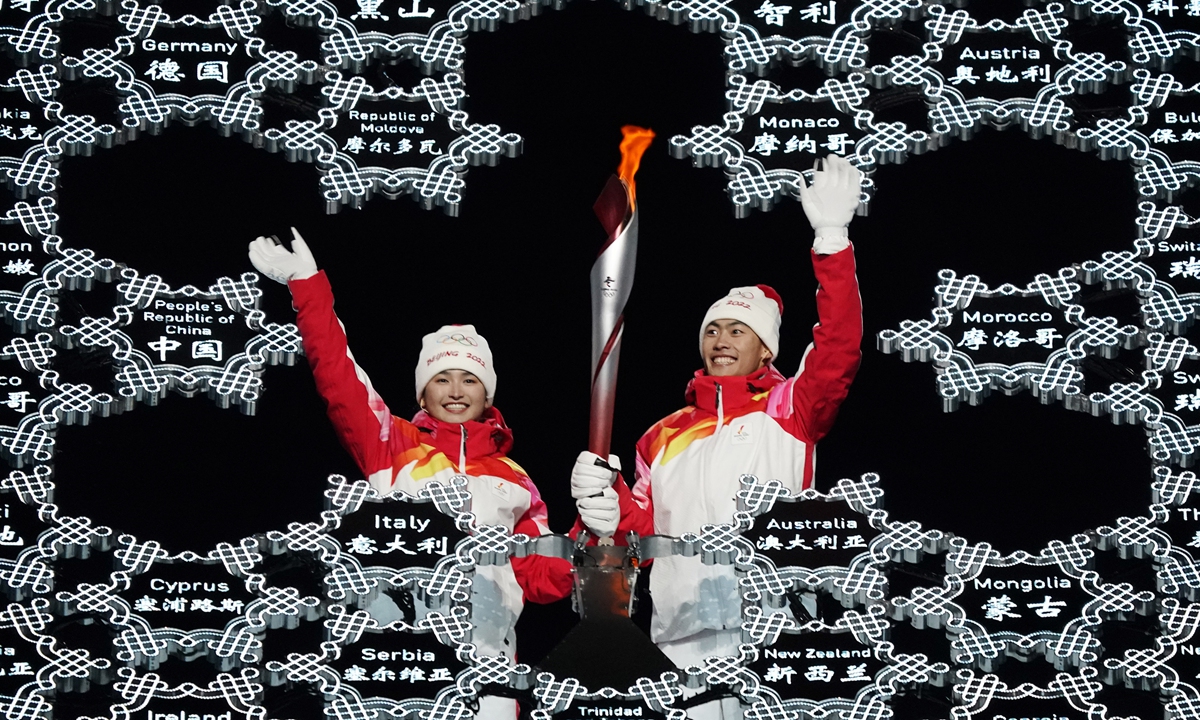Peking University, February 7, 2022: Athletes from Northwest China's Xinjiang Uygur Autonomous Region have won the hearts of viewers with their performances at the Beijing 2022 Winter Olympic Games. The public cheered for them and wished for them to win medals, which many netizens consider would be a fight back against Western smears of the region.
Olympic torch is brought into the stadium by Chinese athletes Dinigeer Yilamujian and Zhao Jiawen during the opening ceremony of the 2022 Winter Olympics, Friday, Feb. 4, 2022, in Beijing.
Of the 176 athletes competing in Beijing, six of them are from Xinjiang, which is a record high.
The six athletes are speed skaters Ahenaer Adake and Tian Ruining, cross country skiers Dinigeer Yilamujiang, Hadesi Badelihan and Bayani Jialin, and snowboarder Wang Ziyang. Of the six athletes, Tian, Dinigeer and Bayani were trained in Xinjiang.
Ahenaer, 20-year-old speed skater, ranked 17th in the speed skating womens 3,000-meter contest on Saturday. Although she did not finish on the podium in her Olympic debut, netizens rushed to her personal social media accounts to leave messages of cheer and encouragement.
Dinigeer and Bayani are both from Altay, Xinjiang, the origin of human skiing. In a 2019 FIS cross-country skiing points race, the two competed together and set the best result in the history of the Chinese team in the event.
These athletes from Xinjiang drew the attention of the Chinese audience and were praised as good sons and daughters of the motherland. "It's so gratifying to find so many talented athletes from the region at the Winter Olympics," a netizen wrote on China's Twitter-like platform Sina Weibo.
In their comments, netizens also noted that it would be a great comeback to these attacks if a gold medal was won by an athlete from Xinjiang, which has been frequently slandered by some Western politicians and media outlets in recent years on the excuse of "human rights issues."
Dinigeer might be the most high-profile athlete from Xinjiang. She delivered the flame to the Olympic cauldron at the opening ceremony of the Winter Olympics and her Uygur roots are considered by some in the Western media to be tinged with layers of symbolism.
"In fact, the West is being petty in its narrow interpretation," Zhang Yiwu, a professor at Peking University, told the Global Times. "Dinigeer is a young athlete from Altay, where human skiing originated and recently blossomed. This is the reason she was chosen, not a deliberate pushback against the West."
The 20-year-old Dinigeer was chosen to deliver the flame mainly from a view of her heritage, said Beijing 2022 spokesperson Zhao Weidong during a press conference on Sunday. The relay of torchbearers according to their age shows that China is passing on the flame in the cause of winter sports.
IOC spokesperson Mark Adams also defended her position. "She is an Olympian competing here. As you will know from the Olympic charter, we do not discriminate against people because of where they are from and what their background is," Adams said, according to the BBC report.
Although Xinjiang is the origin of human skiing and has an extra-long snow season in some areas, the national team for ice and snow sports had few Xinjiang athletes before. In all previous Winter Olympics, only a total of six athletes from Xinjiang region have represented China.
Two speed skaters participated in Calgary 1988 in Canada, Albertville 1992 in France and Lillehammer 1994 in Norway. In 2018, two other speed skaters and snowboarding halfpipe and freestyle skiing halfpipe athletes participated in the Pyeongchang Winter Olympics.
The level of winter sports in Xinjiang has bloomed since Xinjiang successfully held the 13th National Winter Games in 2016. In 2017, the regional government started cooperation with the State General Administration of Sports to comprehensively train and tap outstanding athletes in ice and snow sports for the Beijing 2022.
